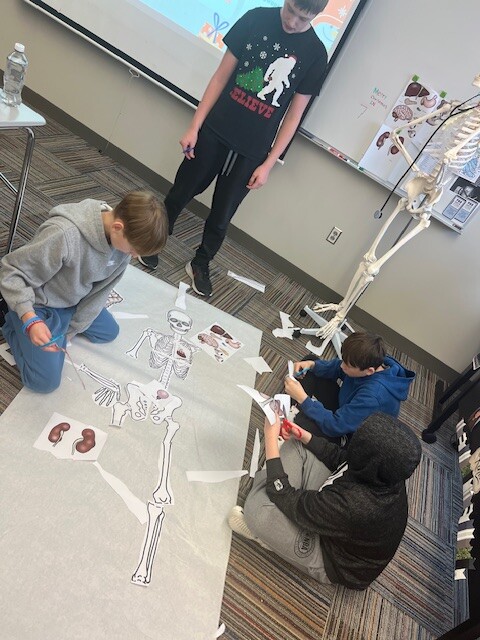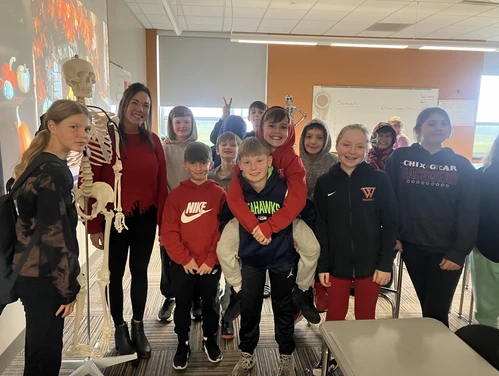
Students at Fort Dodge Middle School learning about and preparing for high-demand careers in health care have an invaluable resource as part of their career and technical education (CTE).
That's because their health occupations instructor, Tatum Whittington, can bring real-world insight and lessons to her students thanks to her non-traditional journey to becoming an educator.
In addition to teaching up to a dozen classes at Fort Dodge Middle School that reach more than 300 students a semester, Whittington is also a practicing cardiovascular technician (CVT) at UnityPoint Health in Fort Dodge. She has more than a decade of experience as a CVT to bring real-world knowledge and application to her students. Through her unique path to the classroom, Whittington provides a different perspective on the array of career pathways available to students.
"These kids are going to be our future and one day be the ones taking care of us," Whittington said. "Health care is always growing and changing, and I think it is important to teach the students about all of the many opportunities available to them."

Working with the Iowa Department of Education’s Board of Educational Examiners (BOEE), Whittington is in the process of earning a Career and Technical Education (CTE) Authorization as she continues to build her program's offerings and reach in Fort Dodge.
Iowa’s CTE authorization allows people with real-world experience in technical fields to share their expertise with Iowa students. In addition to providing a priceless resource to students, the CTE authorizations also help school districts fill vacant teaching positions by creating a pipeline for experienced professionals in technical fields to become educators.
While CTE authorizations have existed for decades, they have seen dramatic growth in recent years, with a 212 percent increase in CTE authorizations earned between 2020-21 and 2023-24. The Department expects continued growth in the program as Cluster CTEs were added last summer that allow CTE authorization holders to expand their curriculum across an entire technical field with experience or additional coursework.
Whittington's health care curriculum focuses on the career opportunities and pathways in those fields and the skills students need to succeed in them. In addition to learning the technical aspects of becoming a health care professional, Whittington focuses on the personal and human capacities required to thrive.
"I'm excited to teach them all of the hands-on skills, such as CPR, stethoscope work and taking blood pressures," Whittington said. "But I feel communicating and being able to talk to people and decipher the severity of a situation and identify ethical dilemmas at this age is also a huge benefit to them."
Whittington's experience in the field gives her a unique perspective to deliver lessons in the context of real-world situations that students may encounter in future careers.
"Giving them examples of where I come from helps students better understand situations when I talk to them about patient care, communicating with patients and families and dealing with difficult situations and stressful environments," Whittington said.
As the child of an educator, Whittington had always been drawn to education and earned an educational studies degree from Buena Vista University. She accomplished her education and training to become a CVT at Southeast Technical Institute (now Southeast Technical College) in Sioux Falls, South Dakota., followed by an internship at MercyOne in Des Moines before returning to her hometown for a position at UnityPoint Fort Dodge.
As Whittington's family grew, her career aspirations transitioned back to education and she took a position in human resources with Fort Dodge Schools while continuing to work part-time at the hospital as her schedule allowed. Then, the lure of the classroom and the ability to impact the next generation of health care professionals while still practicing in that field drew her into the classroom.
"I’ve always strived for the work-life balance where I could continue working at the hospital doing something I loved as well as teaching and still being able to be there for my family," Whittington said. "It all kind of happened at once and was exciting."
The rewards of moving between the hallways of the hospital and school have provided Whittington with the personal satisfaction of impacting young lives while also building a pipeline of educated health care professionals in her community.
"It's really neat to see the lightbulbs go off in their heads and you can see the excitement in their eyes when they see the potential of these careers," Whittington said. "I'm hoping to encourage them to consider something in health care and they're excited about realizing there's more to that than just being a doctor or a nurse."
Moving between careers did not come without doubt for Whittington as she thought about standing in front of a classroom of teenagers every day. However, her students' interest in health care and her ability to deliver lesson plans rooted in real-world experience soon smoothed the transition as she served her community in two different arenas.
A self-described go-getter, Whittington was able to work with UnityPoint, Fort Dodge Community Schools and the Department to take the necessary steps to use her experience to become an educator and share her expertise with students. The rewards of this arrangement have been tangible for students, and Whittington encourages other professionals who think their vast professional experience can impact students to follow her lead.
"My advice, honestly, is just go for it, life is too short!" Whittington said.
Learn more about the educator licensure in Iowa and the licenses and authorizations available, including the initial CTE authorization.
